Academy of Applied Science
SPARKS:2002
National Junior Science and Humanities Symposium: Fabulous 40!
by Doris Cousens, JSHS Director
Palm trees and waterfalls were the backdrop for the 40th National Junior Science and Humanities Symposium (JSHS) in San Diego, April 24 - 28, 2002. More than 240 teenagers from across the United States, Puerto Rico and Department of Defense schools in Europe and the Pacific participated in the four day event that is the highlight of this unique educational program for high school students.
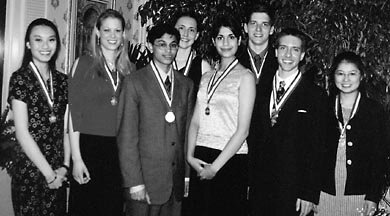 |
?
?
The smiling first place winners of the 2002 JSHS are (l. to r.): Sue Chen (Cordova High School, Cordova, Tenn.), Hailyn Nielsen (Central Academy, Des Moines, Iowa), Debarshi Mustafi (Kenwood Academy, Chicago), Lia Beth LaBrant (Columbia River High, Vancouver, Wash.), Priya Bhatia (Shawnee Mission West, Overland Park, Kansas), David Joseph (Linsly School, Wheeling, W.V.), Ryan Haynes (Cedar Creek, Ruston, La.), and Qilei Hang (Allegany High, Cumberland, Md.).
|
Forty-eight of the attending students presented the results of their original scientific research. To qualify for the national competition, each of the 48 had participated in regional symposia in which they placed first. Their accomplishment is no small success; more than 10,000 students in 48 regions had competed for these top honors. In addition to the 48 presenters of competing papers, another 48 presented non-competitive reports, and 150 other highly placed regional winners earned the opportunity to attend nationals.
One of the major goals of JSHS is to encourage America's high school students to develop an interest in and an affinity for the sciences, mathematics and engineering. The program encourages independent research and the students are exposed to areas of science that they might otherwise not learn about. For example, during the four day stay in San Diego, they were treated to special behind-the-scenes tours of the Aerospace Museum, Scripps Institution of Oceanography, SeaWorld, Palomar Observatory and the San Diego Zoo.
The Junior Science and Humanities Program is uniquely American. Funded by three branches of the U.S. military (the Army, Navy and Air Force), it reaches thousands of students every year because of dedicated volunteers, inspiring teachers and mentors, supportive and encouraging parents and, most importantly, students who are willing to accept the challenges and responsibilities that JSHS demands.
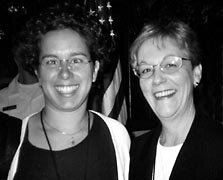 |
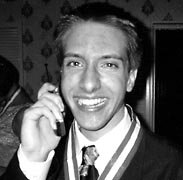 |
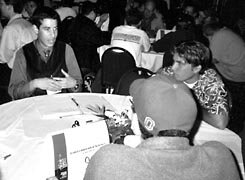 |
? |
| Laila McClay (l.) shared her memories of being part of the National JSHS program in 1993 and again in 1994 with the program's director, Doris Cousens. |
"I won!" First place winner Ryan Haynes was quick to grab the cell phone to call home and tell his family the good news! |
Dan Weitz, three-time National Junior Science and Humanities Symposium participant and three-time winner, talks shop with JSHS participants. He also was the moderator of the JSHS Alumni panel. |
? |
JSHS ALUMNI NETWORK
To celebrate the 40th anniversary of the first National Symposium, several new features were added to the program on Thursday, April 25. The morning started off with this year's JSHS participants learning from six former JSHS students who admitted that their college and, consequently, their career choices were shaped in part by their JSHS experience. Laila McClay (JSHS '93 - '94) laughingly told the students that her time in science labs taught her that she hated being in labs but she knew she loved science and loved talking about it. Today Laila is a journalist who translates complex scientific stories into every day language.
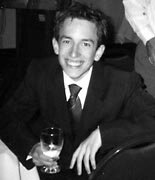 |
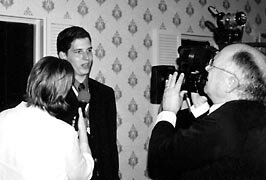 |
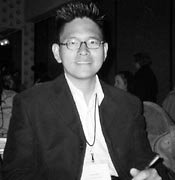 |
? |
| Relief was written all over Felix Pechmann's face after his presentation was completed. Felix was a member of the European delegation. |
Carolyn Choate of the Academy's TV13 - Nashua, N.H., interviewed David Joseph about the inspiration for his paper on "The Hidden Consequences of Tire Wear" as the tape rolled in the capable hands of the station's Gordon Jackson. A segment of the radio show, "Car Talk," was David's inspiration. When the show's producer learned that, he invited David to share his story--live--on the show! |
San Diego State professor Dr. James Nieh was one of the distinguished judges at this year's National JSHS. Sixteen years ago Dr. Nieh was sitting on the other side of the table as a participant in the 1986 National JSHS. |
? |
CAREER QUESTIONS ANSWERED
JSHS students have a passion for the sciences-biology, chemistry, physics and more-and math, but many lack real world knowledge of how that passion will best translate into jobs after college. Another first this year was 32 career round table discussions that were led by experts in various areas. For example, Dr. Lance Benner (JSHS '82) of the Jet Propulsion Laboratory in Pasadena led a discussion on "Near Earth Asteroids." Bernie Kilonsky of the University of Hawaii explored "Oceanography and Experimental Archaeology" while Joyce Dobbs's discussion centered around "Literature, Music and the Business of Engineering." Other topics included intellectual property, animal behavior and communications, environmental issues and artificial intelligence. Many of the hour-long, lively discussions ended with students continuing the topic over lunch and even later into the day.
Since JSHS started in 1958, more than 500,000 students have participated and the impact of the program has dramatically changed many lives. Vancouver, Washington's Lia Beth LaBrant recalls that when she entered high school she "hated science passionately, vowing never to do anything seriously science related." Then one teacher made a difference. "My biology teacher freshman year inspired me by showing me that science could be creative, artistic and simple," Lia explains. "The complexity that increased my interest later was inspired by the initial foundation in simplicity which she presented."
Ryan Haynes of Ruston, La., is an enthusiastic supporter of the JSHS program, which he believes encourages "students hoping to pursue a scientific career. Especially in small towns and small schools (like mine), you rarely get the chance to meet others who are working on research like your own and who are interested in many of the same things you are interested in."
For all of the top winners at the regional and national competitions, the rewards go beyond the personal sense of achievement in a job well done and include substantial financial rewards. With the high cost of education, the scholarship money is greatly appreciated by all of the winners but it means more for some than others. For David Joseph of Wheeling, W.V., for example, it is especially important. The 16 year old explains that he is "one of a set of triplets who will all be attending college in the same year so this scholarship will make things a lot easier." David has set his sights on Embry Riddle Aeronautical University where he wants to study aviation; tuition and room and board total almost $30,000 a year.
Lia, Michael and David are three of this year's first place winners (see photo on page one) and each received scholarships totaling $20,000.
The value of JSHS can be seen in the eyes of the students and heard in the sound of their serious questions and in their laughter. Forty years ago, the far-sighted creators of JSHS knew that America had to encourage its youth to pursue careers in science, engineering and math. The more than 500,000 students whose lives have been touched by JSHS during its first 40 years are a powerful beginning, and the best is yet to come.
?
?
?
?
?
?






